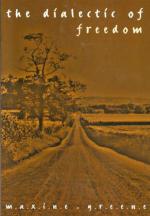|
This section contains 9,116 words (approx. 31 pages at 300 words per page) |

|
SOURCE: "Dewey's Conception of Philosophy," in The Philosophy of John Dewey, Northwestern University, 1939, pp. 49-73.
In the following essay, Ratner examines Dewey 's personal definition and objectives for his philosophy, concluding that Dewey believed philosophy to be an integral element of all human life.
In his opening contribution to Studies in Logical Theory, Dewey outlined a conception of philosophy which, from the vantage point of the present time, we can see he has been working on and working out ever since. It has not, however, been a development proceeding on a smooth and unbroken line. It has not been an unperturbed and undeviating unfoldment of an ideally preformed idea, nourished and sustained by an environment ideally preformed for it. Rather has the development been of a more natural, even of a more human sort. Its historic career is marked by crises, by phases of change—and some of...
|
This section contains 9,116 words (approx. 31 pages at 300 words per page) |

|


